In 2018, plastic began piling up in U.S. recycling centers after China, one of the world’s largest buyers of recyclable plastics at that time, cut off most imports and demanded cleaner, higher-quality material. In 2021, the opposite is true as manufacturers “are scooping up every pound they can find,” says Plastics Exchange founder and CEO Michael Greenberg.
Prices of recycled plastic materials such as HDPE natural, a translucent material that’s easier to re-use because it isn’t dyed, have been trading near or above the price of aluminum. According to Resource Recycling, natural HDPE is selling for 89.31 cents per pound compared with 81.88 cents last in April. Meanwhile, iScrap says recycled aluminum is trading for less than 50 cents per pound, significant because it’s not often that metal is cheaper. Some of this plastic is snapped up by companies that manufacture laundry detergent bottles, for example, says Waste Management account manager and HDPE manager Kurt Humes. Companies are buying as much HDPE natural as they can because they can add brand colors to the translucent plastic. Waste Management is the largest recycler in North America and operates more than 45 facilities across the country where they intake and process recyclable materials.
Humes says there is an ongoing push for big corporations to use more post-consumer plastic, or recycled materials, in their production. And bottle makers aren’t the only ones; large quantities of recycled plastics are also being bought up to create composite deck boards, an important consumer product because of the U.S. lumber shortage. According to Fortune, lumber prices are up more than 280% this year, and so is nearly every other commodity, says Greenberg. The problem is that composite decking, while it uses tons of plastics that would’ve otherwise gone to landfills, can’t be recycled, meaning many of those boards will eventually wind up in landfills.
Many composite decks are built with Trex boards, made from 95% recycled and reclaimed content, including thousands of plastic bags, wraps and films. Zach Lauer, Vice President of Supply Chain at Trex, says the company has thrived during the lumber shortage as availability and rising prices of wood broadened consideration for composite and have made it more affordable. Lauer says Trex’s raw material costs have gone up though, caused in part by increases in the cost of various types of recycled plastics they use.
Greenberg says the lumber shortage didn’t cause the price jumps in resin, an industry term for plastics. It only contributed to an already difficult supply problem that began with an increase in demand for various plastics during the pandemic. Consumer habits changed, requiring more packaged goods at the grocery store instead of, say, restaurant supplies. Online shopping and home deliveries have also dramatically increased the demand for plastic packaging. After the 2020 hurricanes disrupted plastics production, in early 2021, extreme cold weather shut down plants on the Gulf Coast that manufacture resin, creating a tighter market at a time Greenberg says there was already no room for more issues. There just isn’t enough plastic to go around, and it has affected the price of both virgin plastics as well as recycled materials.
“I think this elevated pricing is going to last for a while,” Greenberg says.
Conversely, Recycling Resource recently posted a COVID-19 recycling update that predicts prices of both recycled and virgin resins will fall in a few months, but says recycled materials may not dip as much as virgin resins because COVID-19 has created a new normal of increased demand. The site says North America experienced a 4.5% increase in demand in 2020.
Meanwhile, some cities are struggling to hit recycling goals and states such as Florida are using “back to basics” educational tactics to teach residents how to recycle properly. In Nashville, as much as 46% of what residents put in their green bins isn’t recyclable. While it’s clear not all inbound streams of curbside recycled materials are the cleanest they can be, publications such as WasteDive are reporting that waste companies are putting the pandemic behind them and seeing upticks in both how much they’re able to sell materials for and how much they’re picking up from consumers.
The need for more plastic coupled with supply chain problems made for a tricky pricing situation, but add in a major lumber shortage and you have a situation in which contractors who build decks are struggling to make a profit because of high costs, according to Jeff Mineo. Mineo has been a home contractor since 2008 and says only two home decks out of the more than 125 he’s done in the last 18 months have been made of real wood — in short supply for multiple reasons, including a COVID demand boom and the housing bubble. Mineo says his operational costs have increased an estimated 30% to 40% since last year, a result of complex issues facing the plastics industry.
“I just re-quoted a guy,” Mineo says of a recent deck build. “I quoted him in December at $62,000. [Now it’s] $83,000.”
Contractors, composite deck board manufacturers and consumers are feeling the price and supply squeezes caused by an intense lumber shortage, increased building demand and COVID-19. Mineo says some contractors are on the verge of quitting the business because it’s just not sustainable, even though there’s plenty of work.
Like most composite boards, Trex boards come with a 25 fade and stain year warranty, though Lauer says they are very likely to last much longer — good news at a time when certain plastic use is skyrocketing. In comparison, wood decks can begin deteriorating in under a decade due to rot, staining or termites, according to Trex. Trex also employs a proprietary manufacturing process optimized to reuse factory waste and minimize emissions. Other manufacturers like Fiberon use manufacturing waste to create their product, too. In an email statement, a Fiberon rep said the composite company recycles 98.5% of their manufacturing waste, putting it right back into production.
Although composite boards use up recycled materials that would’ve otherwise ended up in a landfill, it’s not clear if the practice is sustainable in the long term. Three plastics recycling experts were either not available for comment or could not say how a single-use recycled product being created at such a large scale could affect the environment. But according to Waste Management, most composite boards can’t be recycled in curbside pickup programs.
“There may be some niche markets for recycled composite boards, but WM does not currently recycle these materials,” WM Vice President of Recycling Brent Bell said in an email statement.
Conversely, products made from PET plastic, such as drink bottles and cosmetic containers, can be recycled an infinite number of times, again and again. Even laundry bottles made from recycled natural HDPE can still be recycled. Lengthy warranties mean those boards will last longer than a lumber deck, but the inability to recycle them means that when a composite board’s life cycle is over, it will go to a landfill. And reducing plastic use is ever more necessary, given that recent studies have shown that humans may be consuming as much as a credit card’s worth of plastic every week.
How much of this composite lumber will eventually hit landfills may be unknown, but there are real time effects on workers like Mineo, who make hard decisions every day about whether prices will put them out of business.
“That’s one of the conversations that we have almost every time we get a letter that [costs are] going up,’” Mineo says. “We’ll keep going [until] the customer won’t pay it anymore.”
Lonnie Lee Hood is a Tennessee-based journalist who covers politics, labor and news with an eye to the working class. They are working on their first book, “Redneck Revolution,” and live with their cat, dog and hedgehog.












